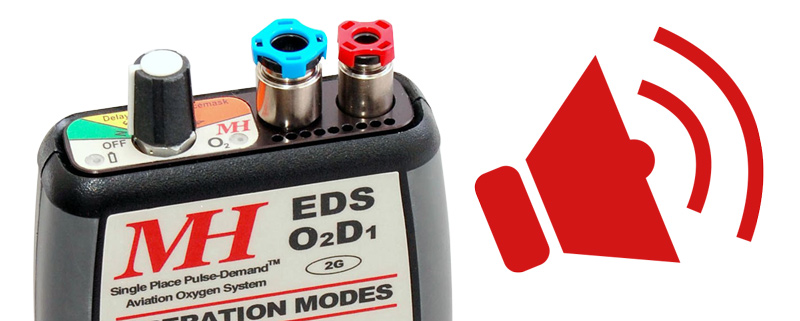Why Is My EDS Alarm Going Off?
EDS Alarm Going Off with Almost Every Breath
Every once in a while, our service department will get an EDS unit sent to us from a customer who complains about the Apnea Alarm (Alert) going off almost every time a breath is requested through the unit.
We test the unit and find no problem, at which time we call the customer and ask for further information. What we usually find is that they have been experiencing the Flow-Fault Alert rather than the Apnea Alert.
The Flow-Fault alert goes off if at any point the delivery of oxygen (valve open) is depleted. It will then alert you to the fact that the supply has been interrupted and that the dosage may not be enough for the altitude you are at. The Apnea Alert is simply a series of beeps to let you know that after ~35 seconds the unit is no longer detecting your breathing.
Additionally, the customer will let us know that this only happens at certain altitudes and certain times. This allows us to suspect that the inlet pressure (~20-25 psig static) is sufficient for operation but the mean flow has become compromised. This can be because the regulator or the feed tubing has developed an obstruction. This will allow the flow-fault detection device in the unit to be satisfied with short bursts of oxygen, but then detect insufficient pressure drops with longer pulses at higher altitudes. We then ask that the regulator and the tubing be sent back as well for further investigation.
Once the equipment arrives, yet again, at our service department, we perform a complete examination. Once again, however, no problem can be found with the unit, regulator or tubing. Again we call upon the user for further information. It is now that the user describes that they do not use the regulator and tubing that came with the unit, rather they connected it directly to one of the fittings that came with the portable or built-in system or cylinder that they already have.
Here is what we usually find:
The oxygen fitting the user decided to connect the EDS unit to has a flow-restricting orifice calibrated for either a cannula or facemask that came with the user’s constant-flow system. The EDS unit had no problem with the small amount of oxygen in the line at ground level or at modest altitudes. However, at higher altitudes where the valve demanded more, the flow-restriction orifice in the fitting limited the flow to the point that the unit experienced a series of true flow-faults. The unit was letting the user know that there was indeed a problem. The fitting was not letting enough oxygen through the tubing to provide the higher demands.
Solution:
The customer connects the originally supplied regulator directly to the cylinder, bypassing about 8 lbs. of fittings and high-pressure tubing, resulting in a unit that now operates to the original specifications and very well at all altitudes.
EDS Quits at Higher Altitudes and Beeps Apnea Alert
The customer complains that the unit quits operation at higher altitudes and simply beeps with the apnea alert. After communicating with the customer, we gather more information where we find that the inlet pressure has been allowed to go over the maximum allowable inlet pressure of ~30 psig. This causes the valve to leak past the plunger.
However, because the fitting being used has a flow-restriction orifice limiting the flow to some smaller amount, it goes undetected by the user. The EDS unit will have a small amount of force present upon the sensor that requires a much more aggressive inhalation effort than normal. Additionally, at higher altitudes the force becomes greater, to the point that almost no inhalation efforts will allow the unit to trigger where the apnea condition then ensues shortly thereafter.
Solution:
The customer connects the originally supplied regulator directly to the cylinder so that it now operates very well at all altitudes.
If you are experiencing any anomalous operations with your system, please look over the manual for an explanation. Additionally, please do not hesitate to call upon us for any advice.



